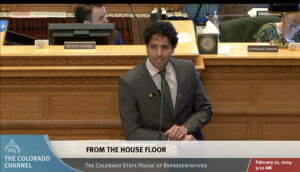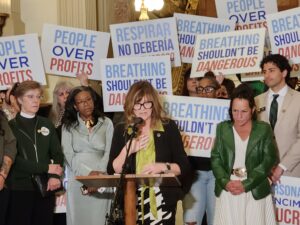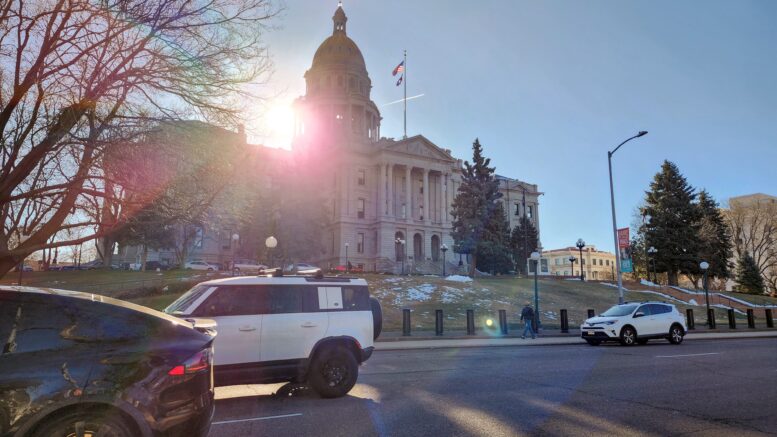A bill to offer more environmental protections to disproportionately impacted communities is advancing in the Colorado Legislature, but without a key provision that would have given local governments new powers to limit operations of emissions-producing facilities.
House Bill 1338, sponsored by Democratic Reps. Manny Rutinel of Commerce City and Elizabeth Velasco of Glenwood Springs, takes several steps to focus more regulation on poorer, industrial-adjacent communities that have experienced high pollution. It directs the Air Pollution Control Division to hire an expert on regulating petroleum refineries, creates a rapid response team within the division to address community concerns and complaints and funds development of two environmental equity and community analyses.
The EECIAs, as they are known, will examine how pollution impacts soil, air, water and a variety of other aspects of public health, and APCD officials will select two communities to undergo the thorough examinations by third-party contractors. Agencies across state government can use results of the analyses in everything from permitting considerations to funding of roads and other infrastructure, allowing for the consideration of cumulative impacts of pollution that environmentalists long have sought.
“I think this is a great example of the sort of bill that advances equity but, in doing so, makes life better for all of us,” Rutinel told the House Energy & Environment Committee before it advanced the bill to the House Appropriations Committee Thursday on a Democrat-led, party-line vote. “This bill will take us one step further in the fight for environmental justice.”

Colorado state Rep. Manny Rutinel speaks on the House floor earlier this legislative session.
Local control pulled from bill
But before moving the bill forward, Rutinel stripped it of a key provision that gave significant pause to business leaders — and, it turns out, to local-government leaders as well.
As introduced, HB 1338 would have let city and county officials request that the Colorado Air Quality Control Commission impose limits on new or expanding facilities that could increase the amount of health-related air-pollution emissions in an area overseen by those officials. Such requests could have lasted for five years and been renewed.
Doug Benevento, a regulatory attorney at Holland & Hart and chairman of the Colorado Chamber of Commerce’s Energy and Environment Council, said that such a proposal amounted to giving local governments a veto over state-permitted facilities. He and other environmental attorneys questioned whether the state could cede its powers to other governments under its designations from the U.S. Environmental Protection Agency to regulate such activity.
Opposition sprang too from local leaders, who told sponsors that they didn’t have either the resources or expertise to document the cumulative impacts needed to make such a production-limiting request to the AQCC, Velasco acknowledged. Both Eagle County Commissioner Matt Scherr and Northglenn City Councilwoman Katherine Goff, the president of Colorado Communities for Climate Action, asked for that section of the bill to be removed at last week’s hearing.
Worries about whether bill does enough
Questions about some provisions of the bill remain. Observers have noted, for example, that HB 1338 would allow for hiring of a full-time employee to craft regulations for petroleum refineries when there is only one such refinery — the Suncor Energy plant in Commerce City — operating in the state.
But no business-industry opponents showed up at the March 21 hearing to testify against the bill. The biggest concerns, in fact, came from environmental organizations worried that the provisions of HB 1338 would not go far enough to clean up the air in low-income communities that have experienced higher levels of pollution for decades.
Rebecca Curry, an attorney for Earthjustice, said the bill did not say explicitly that state agencies must consider the findings in the EECIAs when making decisions that could impact those communities. So, Rutinel added a pair of amendments to the bill that empower state agencies to consider the EECIAs when studying potential alternatives to emissions-increasing projects and that require agencies to show how they will use EECIAs.
“State action to correct environmental injustice is imperative,” Curry said.
“Owe it” to local residents
The bill sprang from the recommendations of the Environmental Justice Task Force, which itself was created three years ago by legislation. Velasco said in a news release following the committee’s passage of the bill that legislators “owe it to our neighbors to implement the recommendations” of the task force.
Several other air-quality bills are of much greater concern to business leaders.

Colorado state Sen. Lisa Cutter speaks at a February news conference at the Capitol to introduce a trio of air-quality bills.
Senate Bill 165, which passed its first committee last week, would pause pre-production activities for oil-and-gas drillers from June through August, launch rulemaking for on- and off-road engines and codify Gov. Jared Polis’ executive order to cut nitrous oxide emissions. While environmentalists said limiting oil-and-gas activities during high-ozone months would clean the air, industry leaders said it would lead to an exodus of workers from the state and leave financially strapped firms unable to acquire lower-emissions equipment.
SB 166, which cleared the same committee on March 20, would label companies that receive five air-quality violations over a three-year period as repeat violators and subject them to higher mandatory fines as it requires greater enforcement of state laws. Manufacturing leaders warned this would destroy the collaborative relationship between companies and regulators that now leads to fixes being found and implemented rather than hidden, and it could lead companies to move work to other, less-regulated states.
More controversial air-quality bills up for votes
Two more bills generating high levels of industry opposition are scheduled over the next two weeks for their initial hearings.
SB 159, up Thursday before the Senate Agriculture & Natural Resources Committee, would ban the state from issuing permits for new oil and gas wells beginning in 2030 and would require a ramp-down of permits starting in 2028. Co-sponsoring Sen. Kevin Priola, D-Henderson, has called it a necessary step for public health, but industry leaders say it will lead to the shutting down of a $48 billion sector that supports more than 300,000 jobs.
HB 1339, which is scheduled for an April 4 hearing before the House Energy & Environment Committee, would eliminate several key compliance mechanisms established for large manufacturing facilities in an emissions-reduction rulemaking in September. Rep. Mike Weissman, D-Aurora, said the AQCC did not follow Environmental Justice Act parameters in setting the rules, while business leaders called the rules a product of compromise to allow both environmental cleaning and continued economic prosperity.
